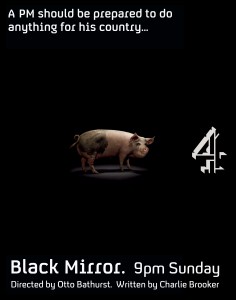The screening which struck me most this week was certainly Black Mirror, a program which gets its name from the opaque screens of televisions, computers, and phones saturating all our lives. I’ll try not to make this post a contemplation on whether “National Anthem” would work in America, as I know I am always tempted to do in this class (most of our blogs feature at least some commentary in this vein), but rather I’ll use the lens of Black Mirror’s significance to Channel 4 and its branding.
The goal in Channel 4’s creation was not just for an ITV clone but for content provider with an entirely new identity serving minority audiences. The remit in Channel 4’s mandate is to “to introduce new talent, to reaffirm creative alliances, or bring together fresh ones, and to develop ideas for which the existing services have not so far found a place.” Not exactly the BBC’s “inform, educate, entertain.” Channel 4 isn’t made to cater to the strict public service mandate of the supposed license-monger BBC, and it thus gets the opportunity to engage with and challenge viewers in a different way.
As Phil Wickham asserts in our text book, Understanding Television Texts, “Despite their diversity, the programmes were being broadcast by a channel marking itself out as new, vigorous and provocative and that affected the way the texts were understood” (UT 35). Perhaps if I were a British viewer actively watching this on Channel 4, I would perceive this episode to be more radical than it was—at least that’s what Wickham might contend due to the influence of the channel’s brand identity. As was parodied in the Brasseye promo we watched in class today, the tertiary network often sensationalizes its own radicalism. One might assert that the premise of “National Anthem” isn’t really all that complex and that the outcome isn’t overly challenging (but rather a cheap stunt put on for shock value).
In my opinion, the anthology episode we viewed was reminiscent of The Twilight Zone, well-executed and thought provoking. Societal critique is still being made, and that’s plenty more challenging than Mrs. Brown’s Boys. “Fuck Offcom” is even muttered by members of the media in the episode. With the kidnapping of a regent, internationally broadcast bestiality, and plenty of cursing, “National Anthem” does seem to fall in line with Channel 4’s image.
Oh, and for the record: This show would never make it onto the American basic cable airwaves.



I agree – this would never make it onto American basic cable. However, I do think it’s just the type of thing something like HBO would pick up. I was absolutely fascinated/horrified by the episode, and I think that’s exactly the type of thing HBO or Showtime would go for to give an alternative to shows such as “True Blood” and “Game of Thrones”. As much as I don’t believe the British government would ever actually make the PM submit to such a stunt, the entire premise of the episode is, in my opinion, entirely plausible in today’s world of Twitter, Youtube, and Facebook. And that, to me, is just as disturbing as the above poster (which is brilliant, by the way).
I agree with both of you on the idea that it would only work on pay cable here in the states. Even the most “What the F%^@?” show on basic cable right now, American Horror Story (which is also going to be an anthology, but by season instead of by episode), which was really hard to watch sometimes, didn’t go as far as Black Mirror does.
The thing that struck me most about the show was its anthology format, which almost makes it progressive by making it regressive, hearkening back to shows like the Twilight Zone, as Mary mentioned, or the anthology dramas that were considered the highest brow TV could aspire to back in the early days of the medium. This fact almost immediately associates Black Mirror with the Quality, socially important, culturally-commenting anthologies of yesteryear, screaming, “Watch me! I’m important, and I am saying something about contemporary society through a thinly veiled parable about the world on your side of the TV screen!”
The other thing that disturbed me about the show is that Charlie Brooker, the creator, is usually hilarious. He makes his living as a media critic, which we obviously saw him adapting for fiction here, but in my experience, he has always done so in a funny, biting way on things like Screen Wipe. Sometimes his jokes are a little dark, but they are always hilarious. Nothing about Black Mirror was funny to me – it was completely jilting because it was not the kind of show I would have expected to have come from the mind of the hilarious Charlie Brooker.
Since American Horror Story aired its finale over break, I’ve been looking for a new “WTF?” TV show. “The River seems to be the answer on the slightly less disturbing/American side of the spectrum and from the right of the map and of the spectrum came Black Mirror with the more disturbing/British answer. Honestly, I never thought something could be more WTF-worthy than AHS, but this certainly takes the cake…..with “…Gypsy Wedding” not trailing far behind.
I like that notion of progressive regression you mentioned, Brenna. It gives viewers a sort of retro prestige. The one-off episode structure with a new cast each week allows for tight control of quality and artistic integrity, which I think holds strong in Black Mirror.
As for Brenna’s comment that there was nothing funny about “National Anthem,” I found that when I described the premise to my friends, most of them laughed. They may be a bit immature, but I think the sheer ridiculousness of making love to a pig on national television can inspire a chuckle. I think the only time we’d get anything similar to bestiality on TV here in the states would actually be on a show like Family Guy or South Park–a satire which would use it for a blunt joke, so maybe being accustomed to that informs that reaction. (Something like this might also appear on Strange Addiction or Strange Sex on TLC, perpetual freak or wedding or freak wedding extravaganza).